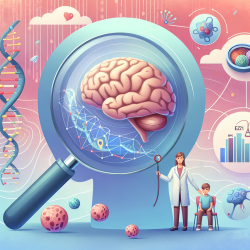Introduction
The realm of neurodevelopmental disorders (NDDs) is a complex and challenging field for practitioners, particularly when it comes to understanding the genetic underpinnings that contribute to these conditions. A recent study titled "Gain and loss of function variants in EZH1 disrupt neurogenesis and cause dominant and recessive neurodevelopmental disorders" sheds light on the role of the EZH1 gene in neurodevelopment. This research not only enhances our understanding of NDDs but also provides valuable insights for practitioners aiming to improve therapeutic outcomes for children.
The Role of EZH1 in Neurodevelopment
EZH1 is a gene that encodes a component of the Polycomb Repressive Complex 2 (PRC2), which is crucial for chromatin modification and gene expression regulation. The study reveals that both gain-of-function and loss-of-function variants in EZH1 can disrupt neurogenesis, leading to various neurodevelopmental disorders. These findings highlight the importance of precise EZH1 activity in the differentiation of neural progenitor cells, which is a critical process in brain development.
Implications for Practitioners
For practitioners in speech-language pathology and related fields, understanding the genetic basis of NDDs can inform more targeted and effective interventions. Here are some key takeaways from the study:
- Genetic Screening: Incorporating genetic screening for EZH1 variants in clinical assessments can help identify underlying causes of NDDs, allowing for more personalized treatment plans.
- Early Intervention: Recognizing the role of EZH1 in early brain development underscores the importance of early intervention in children with suspected NDDs. Early therapeutic strategies can potentially mitigate the impact of these genetic variants.
- Collaborative Care: The complexity of NDDs necessitates a multidisciplinary approach. Collaborating with geneticists, neurologists, and other specialists can enhance the understanding and management of these disorders.
Encouraging Further Research
While the study provides significant insights, it also opens avenues for further research. Practitioners are encouraged to engage in or support research initiatives that explore the therapeutic potential of targeting EZH1 activity. Investigating pharmacological interventions that modulate EZH1 function could lead to novel treatment options for NDDs.
Conclusion
The study on EZH1 variants offers a data-driven perspective on the genetic factors contributing to neurodevelopmental disorders. By integrating these findings into clinical practice, practitioners can enhance their ability to provide effective, personalized care for children with NDDs. As we continue to unravel the complexities of genetic influences on brain development, collaboration and continued research will be key to improving outcomes for affected individuals.
To read the original research paper, please follow this link: Gain and loss of function variants in EZH1 disrupt neurogenesis and cause dominant and recessive neurodevelopmental disorders.










